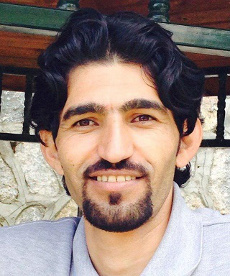Mohammad Salas at Imminent Risk of Execution after Supreme Court Rejects Retrial Bid
 The retrial petition of Mohammad Salas, a member of Iran’s persecuted Gonabadi darvish community sentenced to death for a fatal February bus collision which resulted in the deaths of anti-riot police in highly chaotic circumstances surrounding a crackdown on protesters, has been rejected by Branch 35 of Iran’s Supreme Court, according to June 13 reporting from the Human Rights Activists News Agency.
The retrial petition of Mohammad Salas, a member of Iran’s persecuted Gonabadi darvish community sentenced to death for a fatal February bus collision which resulted in the deaths of anti-riot police in highly chaotic circumstances surrounding a crackdown on protesters, has been rejected by Branch 35 of Iran’s Supreme Court, according to June 13 reporting from the Human Rights Activists News Agency.
The development in a case marked by allegations of hastiness and serious failures of due process was confirmed by both Salas’ defense lawyer Zeynab Taheri and Tehran Prosecutor Ja’fari Dowlatabadi. Dowlatabadi further stated that Salas’ death sentence would be carried out after the month of Ramezan, which ends Thursday, June 14.
In May, Lawyer Taheri went public with allegations that Salas had been tortured after his arrest in order to extract the forced confession used to convict him. She also stated she had been denied the time, access, and case materials required to prepare a proper defense in advance of Salas’ Supreme Court appeal. She submitted a retrial petition on this basis.
At Salas’ original trial, another of his defense lawyers, Sa’id Ashrafzadeh, called attentions to questions which remained about how the incident unfolded and whether anti-riot police had used force properly. He stressed that an expert opinion should be sought regarding Mohammad Salas’ ability to control the vehicle involved in the collision due to his limited eyesight, the physical effects of his broken left hand, and his mental state. He asked the court to question other detainees who knew Salas to determine whether he had previously held thoughts and opinions, which would suggest criminal intent. The original court, presided by judge Mohammadi Kashkuli nonetheless issued the verdict the next day.
For more on the case of Mohammad Salas, Iranian officials’ persecution of the Gonabadi community, see ABC’s newsletter, “For Mohammad Salas, a Retrial is the Least Iran’s Judiciary Can Do.”





 My Interrogator Said: You Are An Ass, And Asses Do Not Merit Human Rights
My Interrogator Said: You Are An Ass, And Asses Do Not Merit Human Rights